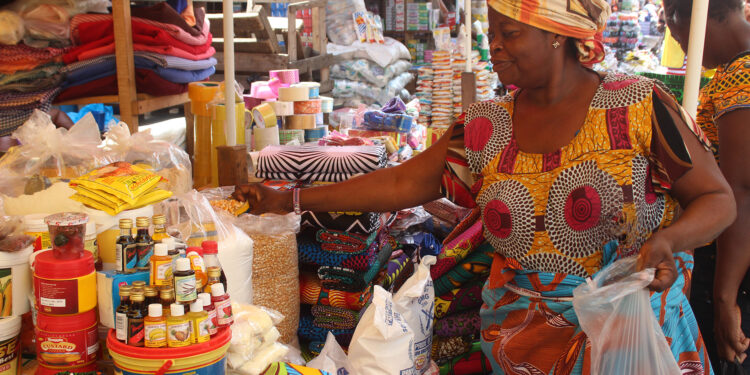Accra- Women in Ghana are considered a real asset to their families and society in general, as they control approximately 85% of the labor market, especially with the remarkable economic development that the country has witnessed since 2008.
Experts attribute this to the role of women in activating the economy, as the so-called “Market Queens Association” was established, and businesswomen began to travel abroad for the purpose of trade and revitalizing Ghanaian markets.
Families want to put their girls into the labor market so that they can support the family, rely on themselves, and secure the future of their children. The woman who sold peanuts, pineapples, and bananas has become a trader in the markets of the capital, Accra.
In a previous interview with Al Jazeera Net, businesswoman Lovely said that she moved from selling fish to selling shoes to farming and finally to real estate trading.
She said, “If a woman in Ghana does not take care of herself, she will not find anyone to take care of her. If she is rural or from a poor family, she must take care of herself in any way, and perhaps help her family as well. The family considers the girl of the family to be the most capable of supporting her because of the strength and determination that distinguishes her.” About the male.
Economic and political presence
The past decade has witnessed the access of women in Ghana to most fields of work after they were limited to trade, agriculture, and some other manual professions. However, they have recently reached high positions in the state and ran for presidential elections. This is not enough, according to the opinion of electronics engineer Jefa, who was responsible for the Jefa website for promoting industries. Ghanaian Feminism Online.
Speaking to Al Jazeera Net, Jeeva says, “Ghanaian women need role models. For example, I traveled to America when I was 12 years old, and I was influenced by many successful personalities such as Oprah Winfrey, but when I returned to Ghana, I found that girls do not have an ideal. Their ideal is… “It is any woman who is successful in her business and only has money, and this is not enough as a measure of success.”
Through her project, Jefa seeks to promote Ghanaian women’s industries abroad, because she believes in the need to empower women more broadly by learning professions and linking them to education, as the daily livelihood that some women are satisfied with cannot be developed, according to her.
She added, “My project is just an initiative to show the capabilities of Ghanaian women. It brings in a good profit that supports women who make products such as accessories, antiques, cosmetic creams, soap, and leather bags. But women in Ghana also need many projects and initiatives to be able to change their lifestyle and raise their awareness.”
illiteracy
Illiteracy among women in Ghana constitutes about 50%, as parents refrain from sending their children to school – especially girls – especially in the countryside. They believe that it is better for her to learn a profession to support her children in the future, and early childbearing – whether from marriage or outside of marriage – is considered… Its framework – one of the reasons that prevent girls from getting education, as families may be forced to marry girls at the age of 10 or 12 years old due to poverty.
Because girls are traditionally considered reproductive wealth, the tribes seek to increase the number of their members by having more than 6 children in one family. In the event of the father’s absence or his evasion of responsibility for the children, the woman bears full responsibility for raising and securing livelihoods for the children.
Student Kifti says that she worked as a domestic maid to pay for the school where she learned the art of sewing and fashion design.
She adds that since she was young, she relied on herself, but she decided to learn a profession so that she could create her own project in the future.
Kifti continues, “I faced many difficulties in terms of hunger and want. No one could support me, but I refused to remain a maid or a saleswoman, so I worked to save money to study the field I wanted. Unfortunately, studying is not free, and the state’s initiatives to empower girls and women are very few and do not meet the needs of women in Ghana.” .
Despite everything that Ghanaian women bear on their shoulders, they have not escaped racial discrimination. Despite their effective and growing role in various fields, they still suffer from gender inequality, especially in rural employment. This is widespread in the northern regions, and the rate of discrimination in employment may decrease in the regions. Urban, but it may take another form.
Exposure to violence
In turn, lawyer Elnor Barnes says that Ghanaian women suffer discrimination, are subjected to psychological abuse and economic struggle, and men view them as a sexual object and try in every way to exploit them.
She adds, “There are laws that provide for the protection of Ghanaian women, such as the Domestic Violence Law issued in 1992 and the Marriage Law that prevents the marriage of underage girls and polygamy, but there are other forces that prevent Ghanaian women from resorting to the law if they are exposed to violence, which are tribal laws and societal customs and traditions that impose A woman is in a very narrow trench, which is sometimes difficult for her to cross.”
Parnis believes that amending Ghanaian laws and imposing stricter penalties on the aggressor man – whether he is a husband, lover, or father – and requiring him to provide children and their expenses, may lead to better protection of women and reducing their violence and assault, which is a step that the government must take urgently.



